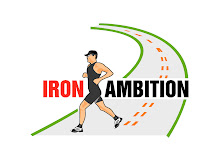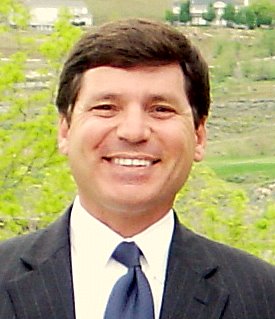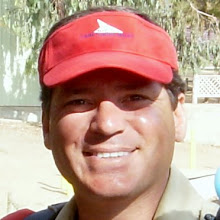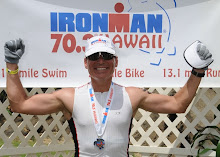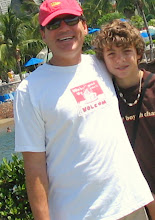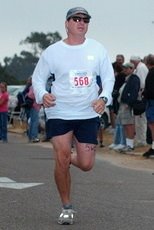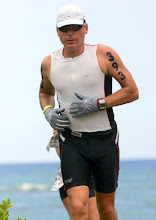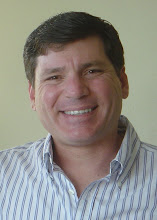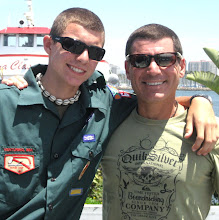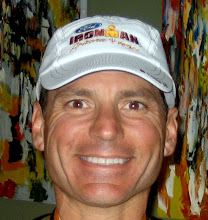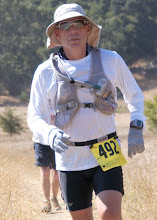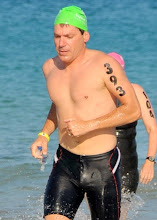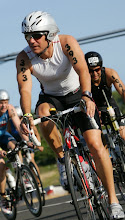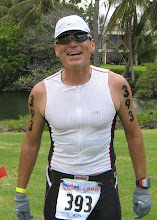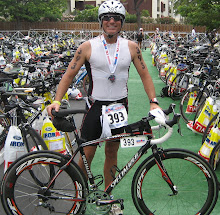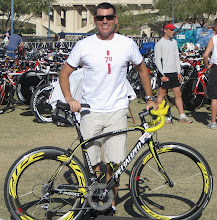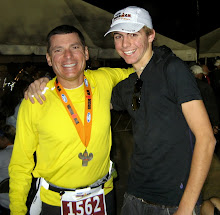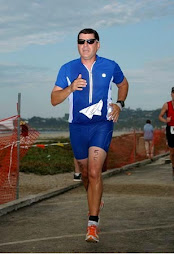Building and running a consulting and training company has taken me around the country and the globe. Usually in First Class.
My favorite seat is 2A.
Sometimes I'd get quite irritable when crammed into the very small seats in the commuter jets that are the only way to get to certain clients. And why wouldn't I? I was a very big guy. I didn't need a seat belt extender...but I was getting pretty close on some of those planes.
So whenever possible, I always tried to secure the extra space available in First Class, seat 2A. A window seat where no one would be stepping over me. It was roomy and of course there was all the free beer and salty snacks I desired.
I learned that the beer always gave me a headache. But by the time I took my return trip, it seems that I always forgot how bad the headache was on the flight over. "Coors Light, Please, I'm watching my carbs."
For me, "Seat 2A" is synonymous with the fast-paced, soft lifestyle I was enjoying.
Great food and plenty of it. Desert? Sure! But who has time for working out?
Naturally gifted in running and soccer in high school, I really didn't start gaining weight until my late 30s. Following high school, I really did nothing consistently for a period of at least 25 years. But as my metabolism changed and my business prospered the weight piled on quickly.
It's pretty easy to hide those extra pounds in a suit. In fact, it is REMARKABLY easy to hide the weight. Keep that jacket buttoned, and no one has a clue that your waist has grown by 6 - 10 inches.
But the face does not lie.
The face, cheeks, jowls are a sure give-away if you are gaining weight.
And my face had gradually blown-up like a balloon. Literally! Take a look at those BEFORE side photos!
So what caused me to stop and suddenly make this lifestyle change?
As I have posted before, I literally tried every crazy scheme, every diet, every pill, every Internet program, no carbs, etc.
I was impatient and wanted quick results. I got quick results in terms of losing water weight. I skipped meals and lost a lot of muscle, exacerbating my problem as my metabolism slowed to a crawl. I stupidly believed that skipping meals meant fewer calories, and I actually thought that was the way to lose weight.
I enjoyed watching The Biggest Loser tv show and found that very motivating. For the first time I saw how hard work, along with diet, was having amazing, dramatic results. Just unbelievable. I think that show is just amazing. Of course, I really hate that artificial suspense but I suffered through each show monitoring their progress.
That was a start on this path.
But for me, it was all about committing to something and being held accountable by friends and others. So I signed up for a triathlon and interviewed a lot of triathlon coaches to work with me.
The accountability of a coach made all the difference in the world.
I tried working on my own, but that was far too easy to skip a workout and there were no consequences.
So From 2A to Ironman is my way of referencing the journey from corporate excess and sloth to a disciplined and consistent program leading to my goal of completing a full Ironman Triathlon in Tempe Arizona in November 2008.
Jul 10, 2008
Jul 9, 2008
Hard Work, without Discipline, spells Disaster!
The other morning I was running on the beautiful Cal State Long Beach 400 meter composite oval track. It was so early that I had the track completely to myself in the final pre-dawn minutes.
I had ridden my fixed gear bike to the track in the dark and after a solid warm up, I was feeling pretty good.
This morning was set aside for 6-minute repeats where the workout called for me to build up to heart rate zone 3, but not slip into zone 4; that requires careful monitoring and pacing to be pulled off correctly.
But as I’m doing my first repeat, I am feeling so good and fresh (legs felt very light, strong and springy) that I made the decision on the fly to try and set a new record for a mile.
Granted, the workout called for 6-minute repeats and to build to HR zone 3, which in my case means to keep a 1 minute pace for every 200 meters (an 8 minute mile pace). I normally check my HR monitor every 200 meters to see that I am on pace and the HR is within range.
But not today.
After the first lap, I just decided to go for it and not look at the monitor, just max out at a full-on sprint and instead of running the typical 3 laps, go for the full mile at full tilt.
S-T-U-P-I-D!!
As I was running in the pre-dawn I am thinking of Peter Reid’s comment in that documentary on his triathlon training. He was so proud of riding his bike in the snow because he knew that “nobody else was working this hard, so I am gaining fitness over them!”
Sometimes we mistake hard work for effectiveness. Especially Triathletes.
Working hard without Discipline, is a recipe for disaster. Just pushing harder and harder, without the discipline of rest, diet, stretching, hydration, fueling/nutrition and staying within our abilities or our prescribed HR zones can lead to huge problems, including serious injuries, bonking on rides, a plateau in our improvements or even a trip to the hospital in the case of serious hydration deficiencies.
We must have the discipline to stay within our abilities and the discipline to tell ourselves “NO” especially when coming up with some hair-brained idea in the middle of the workout.
Examples? Sure, I have plenty!!
-Trying to set a new mile record on the track without being warmed up, pulling a calf muscle and having to end the entire next three days of workouts;
-Not picking up a water bottle or nutrition if it drops on the road and either bonking or suffering from dehydration;
-Deciding that it might be interesting to ride the 112 miles from Long Beach to Santa Barbara (on a whim) without the proper cycling base and in the middle of a horrible winter windstorm. Not turning around when it really got cold and extremely windy because that would be “admitting defeat.”
-While on a recovery day, getting into a heated race with a cyclist who passed me on Pacific Coast Highway and chasing him down to Laguna Canyon, only to find myself totally spent and barely able to make the return ride home;
-Trying to set a new record during my weight lifting session and pulling so hard, so quickly, that I threw out my back and had to be helped off of the machine by others in the gym!
-Trying to ride to the top of a mountain just to be able to point and say I conquered that peak, even when I was unprepared and woefully under-trained for the extreme grade;
-Thinking that it would really be great bragging rights to say that I ran from Carpinteria to Ventura (16 miles) when my longest run prior to that was only about 6 miles. (This idiotic move cost dearly: I lost 4 toenails and developed plantar fasciitis; setting me back at least a month!).
I could go on and on.
Point is that we need to be disciplined about our training; hard work alone, is not the answer
We must be disciplined to say “NO” to the fun and exciting diversions or “tests” if they are not part of our overall training plan and strategy. Sometimes, that is really hard to do because you will have a lot of extra energy and feel totally capable to do more, to ride further, to lift more weights, to run faster, etc. But any of these could lead to the unanticipated injury which could really set your training back by days or even weeks or months.
We all work hard. But champions, I believe, have that extra bit of discipline to hold back despite the strong desire to push even harder. Champions understand that training is a process, not a single event.
Champions are patient, disciplined and they work hard when that’s what their workout calls for. It’s my belief that you really need all three.
Hard work without the discipline to hold back can only lead to disappointment, and ultimately, injury.
I had ridden my fixed gear bike to the track in the dark and after a solid warm up, I was feeling pretty good.
This morning was set aside for 6-minute repeats where the workout called for me to build up to heart rate zone 3, but not slip into zone 4; that requires careful monitoring and pacing to be pulled off correctly.
But as I’m doing my first repeat, I am feeling so good and fresh (legs felt very light, strong and springy) that I made the decision on the fly to try and set a new record for a mile.
Granted, the workout called for 6-minute repeats and to build to HR zone 3, which in my case means to keep a 1 minute pace for every 200 meters (an 8 minute mile pace). I normally check my HR monitor every 200 meters to see that I am on pace and the HR is within range.
But not today.
After the first lap, I just decided to go for it and not look at the monitor, just max out at a full-on sprint and instead of running the typical 3 laps, go for the full mile at full tilt.
S-T-U-P-I-D!!
As I was running in the pre-dawn I am thinking of Peter Reid’s comment in that documentary on his triathlon training. He was so proud of riding his bike in the snow because he knew that “nobody else was working this hard, so I am gaining fitness over them!”
Sometimes we mistake hard work for effectiveness. Especially Triathletes.
Working hard without Discipline, is a recipe for disaster. Just pushing harder and harder, without the discipline of rest, diet, stretching, hydration, fueling/nutrition and staying within our abilities or our prescribed HR zones can lead to huge problems, including serious injuries, bonking on rides, a plateau in our improvements or even a trip to the hospital in the case of serious hydration deficiencies.
We must have the discipline to stay within our abilities and the discipline to tell ourselves “NO” especially when coming up with some hair-brained idea in the middle of the workout.
Examples? Sure, I have plenty!!
-Trying to set a new mile record on the track without being warmed up, pulling a calf muscle and having to end the entire next three days of workouts;
-Not picking up a water bottle or nutrition if it drops on the road and either bonking or suffering from dehydration;
-Deciding that it might be interesting to ride the 112 miles from Long Beach to Santa Barbara (on a whim) without the proper cycling base and in the middle of a horrible winter windstorm. Not turning around when it really got cold and extremely windy because that would be “admitting defeat.”
-While on a recovery day, getting into a heated race with a cyclist who passed me on Pacific Coast Highway and chasing him down to Laguna Canyon, only to find myself totally spent and barely able to make the return ride home;
-Trying to set a new record during my weight lifting session and pulling so hard, so quickly, that I threw out my back and had to be helped off of the machine by others in the gym!
-Trying to ride to the top of a mountain just to be able to point and say I conquered that peak, even when I was unprepared and woefully under-trained for the extreme grade;
-Thinking that it would really be great bragging rights to say that I ran from Carpinteria to Ventura (16 miles) when my longest run prior to that was only about 6 miles. (This idiotic move cost dearly: I lost 4 toenails and developed plantar fasciitis; setting me back at least a month!).
I could go on and on.
Point is that we need to be disciplined about our training; hard work alone, is not the answer
We must be disciplined to say “NO” to the fun and exciting diversions or “tests” if they are not part of our overall training plan and strategy. Sometimes, that is really hard to do because you will have a lot of extra energy and feel totally capable to do more, to ride further, to lift more weights, to run faster, etc. But any of these could lead to the unanticipated injury which could really set your training back by days or even weeks or months.
We all work hard. But champions, I believe, have that extra bit of discipline to hold back despite the strong desire to push even harder. Champions understand that training is a process, not a single event.
Champions are patient, disciplined and they work hard when that’s what their workout calls for. It’s my belief that you really need all three.
Hard work without the discipline to hold back can only lead to disappointment, and ultimately, injury.
Labels:
commitment,
discipline,
fixed gear,
fixie,
heart rate zone
Jul 6, 2008
What about the Time Commitment?
Sometimes the time commitment required to complete all the training workouts can really be a drag.
Fifteen hours a week may not seem like that much on paper, but believe me, by the time you fill up your water bottles, prep your bike, get your heart rate monitor set up, plan your route, get all of your gear together, etc., you really need to add as much as 15 additional minutes per workout.
Of course, you also need to add in the "procrastination factor" which is the little internal debate about whether it is:
-Too Cold
-Too Early
-Too Dark
-Too much Rain
-Too Hot
-Too Late
-Too Close to Dinner
-Too Windy
-Etc.
The "procrastination factor" is just one more thing you have to fight off to get yourself moving.
Depending on the day, this factor can add another 5 minutes to several hours (especially if you have a more exciting project to work on!)
I wouldn't double the time commitment, but I might say it could be another 1/3rd more when you add-in all these other things. So a 15-hour workout week is actually about 20 hours. And as I write this, I am silently nodding, thinking, "Yep. That really does sound about right, and maybe even a little bit light when you factor-in additional stretching, special meal and shake preparation, etc."
OK, so a 20-hour commitment may not see all that much, but when you consider that to train properly, you really must get a minimum of 7 - 8 hours of sleep each night, that only leaves about 16 hours each day for everything else. After work, personal hygiene, meals, commutes, family time, etc., there is really very little else that one can do other than these workouts.
Here we are at the beach house on vacation. I brought all kinds of reading and some great triathlon and biking magazines to read, plus I have every intention of watching the Tour de France.
But none of this will get done because my workouts, and all related preparation, must take priority.
As I have posted before, if I don't do the workouts first thing, the day will quickly fill with other things and I will have no opportunity to fit them in.
So now I must pull myself away from this computer having already exhausted 10 minutes toward my "procrastination factor" this morning!
Plus, there is a big fire raging in Goleta, just 20 miles up the coast, and it's really overcast today, so maybe......
Fifteen hours a week may not seem like that much on paper, but believe me, by the time you fill up your water bottles, prep your bike, get your heart rate monitor set up, plan your route, get all of your gear together, etc., you really need to add as much as 15 additional minutes per workout.
Of course, you also need to add in the "procrastination factor" which is the little internal debate about whether it is:
-Too Cold
-Too Early
-Too Dark
-Too much Rain
-Too Hot
-Too Late
-Too Close to Dinner
-Too Windy
-Etc.
The "procrastination factor" is just one more thing you have to fight off to get yourself moving.
Depending on the day, this factor can add another 5 minutes to several hours (especially if you have a more exciting project to work on!)
I wouldn't double the time commitment, but I might say it could be another 1/3rd more when you add-in all these other things. So a 15-hour workout week is actually about 20 hours. And as I write this, I am silently nodding, thinking, "Yep. That really does sound about right, and maybe even a little bit light when you factor-in additional stretching, special meal and shake preparation, etc."
OK, so a 20-hour commitment may not see all that much, but when you consider that to train properly, you really must get a minimum of 7 - 8 hours of sleep each night, that only leaves about 16 hours each day for everything else. After work, personal hygiene, meals, commutes, family time, etc., there is really very little else that one can do other than these workouts.
Here we are at the beach house on vacation. I brought all kinds of reading and some great triathlon and biking magazines to read, plus I have every intention of watching the Tour de France.
But none of this will get done because my workouts, and all related preparation, must take priority.
As I have posted before, if I don't do the workouts first thing, the day will quickly fill with other things and I will have no opportunity to fit them in.
So now I must pull myself away from this computer having already exhausted 10 minutes toward my "procrastination factor" this morning!
Plus, there is a big fire raging in Goleta, just 20 miles up the coast, and it's really overcast today, so maybe......
Labels:
excuses,
get started,
inspiration,
motivation,
procrastination
Jul 5, 2008
My Friend, the Beetle
I was running mile repeats the other morning on the Cal State Long Beach track. It's a beautiful location and a great rubber surface, so it's easy on my old knees.
These are tougher workouts, as I have to run 4 - 5 miles at a specific pace and I check that pace every half-lap to make sure I'm on target. These are hard runs and require focused concentration to ensure that I stay on pace while also staying relaxed to keep my heart rate within a very specific zone.
It was early morning and I was the only person at all on the track. It was grand. As my imagination kicked in running around that track, I pretended I was Bill Gates and this was my own private track...all to myself.
Myself and the only living thing in sight, a very large beetle.
This beetle was struggling mightily as well. But his battle was to simply make it across the rubber surface of the track trying to get to the grassy infield area.
Each time I would make my lap around the track, I would notice that my little beetle friend had made progress, just as I had. He was moving very, very slowly, but with each passing lap, I noticed that he was making progress.
I paid special attention to make certain that I did not step on this little guy. I felt like we were brothers in this battle to reach our respective objectives.
Lap after lap after lap, I would look for this little guy and smile as I saw him.
Late in my workout, with just about 1 mile to go, a group of runners took to the track and it was no longer just me and my little beetle friend that had been with me for such a long, hard workout.
With just a few laps to go, when I was struggling the most, I looked forward to monitoring the progress of my beetle friend, again making certain to avoid him when I got to that one section of the curved portion of the track.
Then on my last lap, on the last final turn, looking forward to see my beetle friend for the last time, I discovered that one of the runners who had recently started jogging around the track had just squashed this little guy as flat as a pancake.
He certainly felt no pain to be sure, as he was summarily squashed with a hard quick stomp.
I was really surprised how much that bothered me.
It was almost as if they had killed my pet.
Something happens to us when we struggle hard and suffer together with a friend. Be it in workouts, group rides or a race.
We are brothers in sport, in pain, in suffering, in accomplishment. It's a bond that only those who suffer can understand.
And so that day, I lost a brother to a careless runner who thought nothing of stomping my running partner.
Just a beetle? What's the big deal? This fellow was my workout partner in my book and I was sad to lose him. I looked forward to watching and monitoring his progress.
I was really disappointed that he didn't make it to the infield.
These are tougher workouts, as I have to run 4 - 5 miles at a specific pace and I check that pace every half-lap to make sure I'm on target. These are hard runs and require focused concentration to ensure that I stay on pace while also staying relaxed to keep my heart rate within a very specific zone.
It was early morning and I was the only person at all on the track. It was grand. As my imagination kicked in running around that track, I pretended I was Bill Gates and this was my own private track...all to myself.
Myself and the only living thing in sight, a very large beetle.
This beetle was struggling mightily as well. But his battle was to simply make it across the rubber surface of the track trying to get to the grassy infield area.
Each time I would make my lap around the track, I would notice that my little beetle friend had made progress, just as I had. He was moving very, very slowly, but with each passing lap, I noticed that he was making progress.
I paid special attention to make certain that I did not step on this little guy. I felt like we were brothers in this battle to reach our respective objectives.
Lap after lap after lap, I would look for this little guy and smile as I saw him.
Late in my workout, with just about 1 mile to go, a group of runners took to the track and it was no longer just me and my little beetle friend that had been with me for such a long, hard workout.
With just a few laps to go, when I was struggling the most, I looked forward to monitoring the progress of my beetle friend, again making certain to avoid him when I got to that one section of the curved portion of the track.
Then on my last lap, on the last final turn, looking forward to see my beetle friend for the last time, I discovered that one of the runners who had recently started jogging around the track had just squashed this little guy as flat as a pancake.
He certainly felt no pain to be sure, as he was summarily squashed with a hard quick stomp.
I was really surprised how much that bothered me.
It was almost as if they had killed my pet.
Something happens to us when we struggle hard and suffer together with a friend. Be it in workouts, group rides or a race.
We are brothers in sport, in pain, in suffering, in accomplishment. It's a bond that only those who suffer can understand.
And so that day, I lost a brother to a careless runner who thought nothing of stomping my running partner.
Just a beetle? What's the big deal? This fellow was my workout partner in my book and I was sad to lose him. I looked forward to watching and monitoring his progress.
I was really disappointed that he didn't make it to the infield.
Labels:
880s,
cal state long beach,
CSULB,
mile repeats,
speed work,
timed runs,
track,
university
Jul 2, 2008
HOW TO LOSE WEIGHT

I tried everything.
Every pill. Every diet. Every scheme.
Every Internet program. Every weight loss book and protein shake.
I have done it all.
Nothing worked permanently until I stopped looking for the easy way out and buckled down for the hard, long road back to health and fitness.
Friends, there is no easy, quick, safe weight loss program.
I really don't know why we all look for the quick fix, but when it comes to safe weight loss, there is nothing simple or quick about it. To be totally candid, losing weight is hard work. Damn hard work and it takes a lot of discipline and focus. The moment you take your eye off the prize, the weight starts creeping back!
I do have the answer for permanent weight loss, most won't like this answer, but here goes:
It takes a combination of a lot of exercise where you are breathing relatively hard and sweating. You also need to lift weights or do isomentric exercises for muscle development. Finally, you really need to watch what you eat and how often you eat.
Portion control, timing of meals, the right mix of food types, the number of meals per day, etc. These are all critical factors.
Please understand that no pill will ever melt your fat away.
It will take a lot of hard work, a lot of exercise, a lot of sweating, a lot of discipline and a tremendous focus. I think that most people do not stick with their programs because it is simply a lot of work. So if you think about it as "work" you are probably doomed.
For me, I needed to set deadlines and events.
I knew I was training for an event, and I told a lot of people about it. If I did not finish, then I would have to tell everyone that I quit, and I certainly didn't want to face that! So my event was the Hawaii Ironman 70.3 and my next major event is the full Ironman 140.6 in Tempe Arizona in November 2008.
I also needed the additional accountability of a coach to make sure I stayed on track and did all the workouts.
Every pill. Every diet. Every scheme.
Every Internet program. Every weight loss book and protein shake.
I have done it all.
Nothing worked permanently until I stopped looking for the easy way out and buckled down for the hard, long road back to health and fitness.
Friends, there is no easy, quick, safe weight loss program.
I really don't know why we all look for the quick fix, but when it comes to safe weight loss, there is nothing simple or quick about it. To be totally candid, losing weight is hard work. Damn hard work and it takes a lot of discipline and focus. The moment you take your eye off the prize, the weight starts creeping back!
I do have the answer for permanent weight loss, most won't like this answer, but here goes:
It takes a combination of a lot of exercise where you are breathing relatively hard and sweating. You also need to lift weights or do isomentric exercises for muscle development. Finally, you really need to watch what you eat and how often you eat.
Portion control, timing of meals, the right mix of food types, the number of meals per day, etc. These are all critical factors.
Please understand that no pill will ever melt your fat away.
It will take a lot of hard work, a lot of exercise, a lot of sweating, a lot of discipline and a tremendous focus. I think that most people do not stick with their programs because it is simply a lot of work. So if you think about it as "work" you are probably doomed.
For me, I needed to set deadlines and events.
I knew I was training for an event, and I told a lot of people about it. If I did not finish, then I would have to tell everyone that I quit, and I certainly didn't want to face that! So my event was the Hawaii Ironman 70.3 and my next major event is the full Ironman 140.6 in Tempe Arizona in November 2008.
I also needed the additional accountability of a coach to make sure I stayed on track and did all the workouts.
Labels:
diet,
discipline,
exercise,
hard work,
lose weight,
nutrition,
weight loss
Jun 20, 2008
Motivation after an Injury/Big Race
It's a strange phenomenon.
I worked so hard for so many months to prepare for the Hawaii Ironman 70.3, and I accomplished my goal with a great time. Following the event, I took a 2.5 week break and did nothing at all. The break was necessary to let a long time hip injury settle down, and it worked great. No hip pain at all. However, it is much tougher than I thought it would be to get back into a training groove.
It seems that getting started, with anything, is actually the toughest part of the process.
Getting started, again, back onto a regular, consistent training regimen is tough. Getting started on a major report at the office, getting started cleaning out the garage, getting started with a home remodel.
These are really all the same. The toughest thing is just getting started.
I needed to remodel my home from the second we bought it nearly 14 years ago. But the task was overwhelming and expensive. So I sat on it and only did the most minor of superficial repairs that were absolutely essential. Then finally, I decided just to paint our master bath. That's all. I hired a few guys from the local paint store to help strip off some paint, and the next thing I know, I've completely remodeled nearly every single aspect of our home.
I waited 14 years and did basically nothing. Then in the course of six months I:
-painted every room in the entire house
-painted the exterior
-installed a new slate roof
-installed all new exterior windows and doors
-upgraded all electrical
-installed new fixtures in all bathrooms
-installed all new flooring in 100% of the house
-installed an Endless Pool, deck, landscaping
-did a mini-landscaping upgrade
-installed new granite counter tops in the bathrooms
-installed two new kitchens with all new appliances
-the list goes on and on
The important take away here is two fold:
1. The hardest part is just to get started
2. Once started, the speed in which things get accomplished is absolutely amazing
No one can possibly believe I did this remodel on my own (i.e. no contractor, but of course, subs did all the physical labor) nor the speed in which so much was accomplished.
Finally, I clearly realize that getting started, whether with a training program, an important report, cleaning the garage or a mid six-figure home remodel are all really the same.
As Nike says: Just Do It.
Just get started!
My company, IdeaBridge was started the same exact way...The correlation is amazing.
About ten years ago, sitting in a private room at the Jonathan Club in downtown L.A., my very good friend Joseph challenged me to just get started with a simple step. "Just open a checking account. It doesn't matter what you call it, just open that account and get something started."
He challenged me to start my own company and advise executives on the programs, tools and processes that I had developed over the years to improve the performance of bank executives and sales people. I didn't know about running a training or consulting firm at all.
But once I took him up on the idea, of "Just open a checking account", well a whole series of decisions had to be made and the wheels were set into motion.
What is the name I am going to put on the account? I need a business name. But before I decide on a name, I will need to figure out exactly what we do. Are others doing the same thing? Yep. OK then, how will my company be different, how will we position ourselves, what will we offer, why would people come to us instead of going to others who are more established, how will we price our services, and what exactly ARE our services?
I had to think about all of these things, and try to develop answers to these questions.
It all started with one simple challenge to: "Just open a checking account."
Do you want to get in shape? Do you want to change your habits? Do you want to resume a former schedule and become more disciplined?
My experience has been that you don't need to have the whole thing figured out with a detailed plan just yet.
What you need to do, right now, is commit to taking some small action...today.
Right now if you can!
I worked so hard for so many months to prepare for the Hawaii Ironman 70.3, and I accomplished my goal with a great time. Following the event, I took a 2.5 week break and did nothing at all. The break was necessary to let a long time hip injury settle down, and it worked great. No hip pain at all. However, it is much tougher than I thought it would be to get back into a training groove.
It seems that getting started, with anything, is actually the toughest part of the process.
Getting started, again, back onto a regular, consistent training regimen is tough. Getting started on a major report at the office, getting started cleaning out the garage, getting started with a home remodel.
These are really all the same. The toughest thing is just getting started.
I needed to remodel my home from the second we bought it nearly 14 years ago. But the task was overwhelming and expensive. So I sat on it and only did the most minor of superficial repairs that were absolutely essential. Then finally, I decided just to paint our master bath. That's all. I hired a few guys from the local paint store to help strip off some paint, and the next thing I know, I've completely remodeled nearly every single aspect of our home.
I waited 14 years and did basically nothing. Then in the course of six months I:
-painted every room in the entire house
-painted the exterior
-installed a new slate roof
-installed all new exterior windows and doors
-upgraded all electrical
-installed new fixtures in all bathrooms
-installed all new flooring in 100% of the house
-installed an Endless Pool, deck, landscaping
-did a mini-landscaping upgrade
-installed new granite counter tops in the bathrooms
-installed two new kitchens with all new appliances
-the list goes on and on
The important take away here is two fold:
1. The hardest part is just to get started
2. Once started, the speed in which things get accomplished is absolutely amazing
No one can possibly believe I did this remodel on my own (i.e. no contractor, but of course, subs did all the physical labor) nor the speed in which so much was accomplished.
Finally, I clearly realize that getting started, whether with a training program, an important report, cleaning the garage or a mid six-figure home remodel are all really the same.
As Nike says: Just Do It.
Just get started!
My company, IdeaBridge was started the same exact way...The correlation is amazing.
About ten years ago, sitting in a private room at the Jonathan Club in downtown L.A., my very good friend Joseph challenged me to just get started with a simple step. "Just open a checking account. It doesn't matter what you call it, just open that account and get something started."
He challenged me to start my own company and advise executives on the programs, tools and processes that I had developed over the years to improve the performance of bank executives and sales people. I didn't know about running a training or consulting firm at all.
But once I took him up on the idea, of "Just open a checking account", well a whole series of decisions had to be made and the wheels were set into motion.
What is the name I am going to put on the account? I need a business name. But before I decide on a name, I will need to figure out exactly what we do. Are others doing the same thing? Yep. OK then, how will my company be different, how will we position ourselves, what will we offer, why would people come to us instead of going to others who are more established, how will we price our services, and what exactly ARE our services?
I had to think about all of these things, and try to develop answers to these questions.
It all started with one simple challenge to: "Just open a checking account."
Do you want to get in shape? Do you want to change your habits? Do you want to resume a former schedule and become more disciplined?
My experience has been that you don't need to have the whole thing figured out with a detailed plan just yet.
What you need to do, right now, is commit to taking some small action...today.
Right now if you can!
Jun 19, 2008
Another Tri-Specific Website
I'm thinking about building a simple site to catalogue all the following that I typically have to constantly hunt around for:
Events, Results, Training Plans, Coaches, Camps, News, Equipment and Gear, Ironman.com, Pacing Calculators and Distance Converters, Personal Best Times and Events, Triathlon PodcastsArticles, Tri Clubs, Energy and Nutrition, Books and DVDs, Rentals, Clothing and race gear, Injury/Prevention and Treatment, VO2 Max, Blood Lactate and Chemistry, Sports Massage, Build your own website, Training Tips, Forums, Research, Magazines, Hydration Strategies, Product and Gear Reviews, Classifieds, Getting Aero, Travel and Hotel Bookings, Meal Plans, Retail Stores, Determining your Heart Rate Training Zones,
Some possible links:
http://www.trinewbies.com/http://www.trainingpeaks.com/http://www.powertri.com/http://www.tri-talk.com/http://www.ironman.com/http://www.trisports.com/
Events, Results, Training Plans, Coaches, Camps, News, Equipment and Gear, Ironman.com, Pacing Calculators and Distance Converters, Personal Best Times and Events, Triathlon PodcastsArticles, Tri Clubs, Energy and Nutrition, Books and DVDs, Rentals, Clothing and race gear, Injury/Prevention and Treatment, VO2 Max, Blood Lactate and Chemistry, Sports Massage, Build your own website, Training Tips, Forums, Research, Magazines, Hydration Strategies, Product and Gear Reviews, Classifieds, Getting Aero, Travel and Hotel Bookings, Meal Plans, Retail Stores, Determining your Heart Rate Training Zones,
Some possible links:
http://www.trinewbies.com/http://www.trainingpeaks.com/http://www.powertri.com/http://www.tri-talk.com/http://www.ironman.com/http://www.trisports.com/
Shaving Legs and Aero Helmets
Aero Helmets:
Yes they do save time. It has been proven time and again, however, the greatest time savings appears to be if one is consistently traveling faster than 20 mph. I'm slow, but am still going aero!
Shaving Legs:
Yes, it is proven that shaving one's legs can save time, but the difference is only fractions of a second to maybe 3 - 5 seconds at the most. It is argued that the more practical reason for shaving legs has to do with a few issues such as: it is easier to clean road rash wounds without having to pick through the mangled leg hair, it is easier and possibly more productive for sports massage without hair, and of course there is a very small margin of time savings in non-wetsuit events and on the bike, but those time savings are very, very slight.
Frankly, there is actually a "coolness factor" for shaving legs. It does prompt questions from non-athletes and it gives you the chance to talk about triathlon! I think that's a very good reason and why I've shorn the leg hair. In fact, I prefer waxing. It is not that painful and if you find a good practioner, it is actually quite relaxing. In between waxings, you can use a simple razor in the shower once a week or so to keep things in check.
Yes they do save time. It has been proven time and again, however, the greatest time savings appears to be if one is consistently traveling faster than 20 mph. I'm slow, but am still going aero!
Shaving Legs:
Yes, it is proven that shaving one's legs can save time, but the difference is only fractions of a second to maybe 3 - 5 seconds at the most. It is argued that the more practical reason for shaving legs has to do with a few issues such as: it is easier to clean road rash wounds without having to pick through the mangled leg hair, it is easier and possibly more productive for sports massage without hair, and of course there is a very small margin of time savings in non-wetsuit events and on the bike, but those time savings are very, very slight.
Frankly, there is actually a "coolness factor" for shaving legs. It does prompt questions from non-athletes and it gives you the chance to talk about triathlon! I think that's a very good reason and why I've shorn the leg hair. In fact, I prefer waxing. It is not that painful and if you find a good practioner, it is actually quite relaxing. In between waxings, you can use a simple razor in the shower once a week or so to keep things in check.
Personal Insights, Opinions and Topics of Interest to Triathletes
Best Times to Workout:
Yesterday (4/13/2008) I got up at 5:30 am and prepared for a long ride down through Laguna Canyon and out onto PCH. Total ride of 65 miles or so. I left the house at 6:30 am. I had done most of the prep work the day and night before, which allowed me to hit the road quickly in the morning. But it is important to keep in mind that it does take at least 30 minutes of prep work before a long ride: Oil chain, check for proper air pressure, prepare/mix bottle of liquid nutrition, fill water bottle, check kit for tubes, air and patch kit, pick out the bibs and shirt, make sure cell phone is charged, plan the route, gather all other stuff I will put in my jersey (credit card, emergency info, cash, GU packets, etc.)
The big news is that leaving my house just after sunrise was an entirely different experience. New sounds, new smells, things look different in the light of daybreak vs. mid-day sun, etc. Also I noticed that on an early Sunday morning, there is far less traffic!! What a pure, unimitigated joy!! I felt much safer. I rode through an area I never knew existed: Little Siagon. WOW! Early morning sites, sounds and smells from this area was very unique, and it is huge, it is not "Little" at all!! It is amazing! It is located in Orange County off Edinger or Bolsa in Westminster I believe. Just incredible.
But the important take-away is that it is much better to:
1. Prepare the night before
2. Leave early morning!!
Aero Bike Frames:
No question that in a wind tunnel, aero bike frames consistently prove that they will save you time on the road; the greatest your race distance, the greater the potential savings. Just be aware that your own body contributes to at least 70% of the aerodynamic drag, and at the most, the bike frame contributes to as much as 30%. You'd be far better to focus on your position than the world's most aero frame!
Yesterday (4/13/2008) I got up at 5:30 am and prepared for a long ride down through Laguna Canyon and out onto PCH. Total ride of 65 miles or so. I left the house at 6:30 am. I had done most of the prep work the day and night before, which allowed me to hit the road quickly in the morning. But it is important to keep in mind that it does take at least 30 minutes of prep work before a long ride: Oil chain, check for proper air pressure, prepare/mix bottle of liquid nutrition, fill water bottle, check kit for tubes, air and patch kit, pick out the bibs and shirt, make sure cell phone is charged, plan the route, gather all other stuff I will put in my jersey (credit card, emergency info, cash, GU packets, etc.)
The big news is that leaving my house just after sunrise was an entirely different experience. New sounds, new smells, things look different in the light of daybreak vs. mid-day sun, etc. Also I noticed that on an early Sunday morning, there is far less traffic!! What a pure, unimitigated joy!! I felt much safer. I rode through an area I never knew existed: Little Siagon. WOW! Early morning sites, sounds and smells from this area was very unique, and it is huge, it is not "Little" at all!! It is amazing! It is located in Orange County off Edinger or Bolsa in Westminster I believe. Just incredible.
But the important take-away is that it is much better to:
1. Prepare the night before
2. Leave early morning!!
Aero Bike Frames:
No question that in a wind tunnel, aero bike frames consistently prove that they will save you time on the road; the greatest your race distance, the greater the potential savings. Just be aware that your own body contributes to at least 70% of the aerodynamic drag, and at the most, the bike frame contributes to as much as 30%. You'd be far better to focus on your position than the world's most aero frame!
My Workout Schedule
I work out for 9 - 15 hours a week. But preparing for the workouts, dressing, changing, mixing various concoctions of energy drinks, planning my routes for the runs and bike rides, maintaining my gear and recording all of my results takes at least as much time. So the weekly commitment is closer to 20 – 25 hours.
I work out six days each week. Adding the preparation and pre-workout planning to each day’s workouts means that I must allocate about 3 – 4 hours per day, depending on the workout.
Some days, such as the weekends, involve significant time commitments to complete a 75 mile bike session or a 13 mile run. Almost every workout involves training in multiple disciplines, and quite often three different workouts in a single day.
Despite my best intentions of working out after business hours, the facts are that I have learned time and again that my best chances of completing a workout is if I start them first thing in the morning. Trying to set time aside in the evening is very risky because legitimate things unexpectedly pop up: every day. Also, one can have a tough day, be wiped out and really not be in the mood at all to work out.
It is far better to get up earlier and just do it.Having said that, I do not always get my workouts done in the mornings. Often, my workouts require a break between them, so there is no way to get them done at one time. On most days, I work out in the morning, and the evening.
My training includes: running, cycling, swimming, weightlifting and various drills, core exercises and stretching. Training also requires plenty of sleep 7 - 8 hours, the occasional nap on the weekends (I should do this more often, but don't), proper diet and nutritional supplements, and sports massage. The risk of injury increases when muscles are not as pliable and flexible, and thus the need for consistent sports massage. This isn't a spa treatment; in fact it's often quite painful!
I work out six days each week. Adding the preparation and pre-workout planning to each day’s workouts means that I must allocate about 3 – 4 hours per day, depending on the workout.
Some days, such as the weekends, involve significant time commitments to complete a 75 mile bike session or a 13 mile run. Almost every workout involves training in multiple disciplines, and quite often three different workouts in a single day.
Despite my best intentions of working out after business hours, the facts are that I have learned time and again that my best chances of completing a workout is if I start them first thing in the morning. Trying to set time aside in the evening is very risky because legitimate things unexpectedly pop up: every day. Also, one can have a tough day, be wiped out and really not be in the mood at all to work out.
It is far better to get up earlier and just do it.Having said that, I do not always get my workouts done in the mornings. Often, my workouts require a break between them, so there is no way to get them done at one time. On most days, I work out in the morning, and the evening.
My training includes: running, cycling, swimming, weightlifting and various drills, core exercises and stretching. Training also requires plenty of sleep 7 - 8 hours, the occasional nap on the weekends (I should do this more often, but don't), proper diet and nutritional supplements, and sports massage. The risk of injury increases when muscles are not as pliable and flexible, and thus the need for consistent sports massage. This isn't a spa treatment; in fact it's often quite painful!
My Coach and Equipment
My Coach:
I am very priviledged to be working with the world's leading researcher on Tri-Specific training issues, the #1 Podcaster and incredible coach for triathlon, David Warden.
We share a very strong interest in researching the facts and numbers and science of training. David works very closely with Joe Friel, the father of all Triathlon training and the author of nearly all leading Tri-specific training books, including the best selling Triathlete's Training Bible.
Our Relationship:
David is not a cheerleader coach, rather, his coaching is based on science and tracking the data.Recording the Workouts:I record every run with a heart rate monitor and GPS (Garmin Forerunner 405). The pace, HR, distance and all other relevant data is forwarded to David every day. I record every bike workout with a PowerMeter (Powertap 2.4 wireless by CycleOps). The watts produced by my cycling, along with my cadence, heart rate, speed and all other data, are recorded and sent to David for detailed analysis. Progress is monitored and tracked. New workouts are developed based upon my recent results.
My swim workouts take place in my Endless Pool (www.EndlessPools.com). This is a 9' x 12' above ground pool with an extremely powerful hydraulic motor that creates a current of up to 3 mph. I swim in this current like a salmon swimming upstream. I typically swim at about 2 - 2.25 mph in this pool, but I don't know how that will equate in open water. It's an incredible piece of engineering and we also use the pool on the weekends as a huge hot tub/spa. The pool was extremely expensive, and in hindsight, may not have been worth the expense. But I will say that it is definitely better than a lap pool because there are no walls to kick off; you are swimming in the current the entire time.
While I have some of the world's finest bikes and equipment, it won't make me any faster; speed is up to me.
I am very priviledged to be working with the world's leading researcher on Tri-Specific training issues, the #1 Podcaster and incredible coach for triathlon, David Warden.
We share a very strong interest in researching the facts and numbers and science of training. David works very closely with Joe Friel, the father of all Triathlon training and the author of nearly all leading Tri-specific training books, including the best selling Triathlete's Training Bible.
Our Relationship:
David is not a cheerleader coach, rather, his coaching is based on science and tracking the data.Recording the Workouts:I record every run with a heart rate monitor and GPS (Garmin Forerunner 405). The pace, HR, distance and all other relevant data is forwarded to David every day. I record every bike workout with a PowerMeter (Powertap 2.4 wireless by CycleOps). The watts produced by my cycling, along with my cadence, heart rate, speed and all other data, are recorded and sent to David for detailed analysis. Progress is monitored and tracked. New workouts are developed based upon my recent results.
My swim workouts take place in my Endless Pool (www.EndlessPools.com). This is a 9' x 12' above ground pool with an extremely powerful hydraulic motor that creates a current of up to 3 mph. I swim in this current like a salmon swimming upstream. I typically swim at about 2 - 2.25 mph in this pool, but I don't know how that will equate in open water. It's an incredible piece of engineering and we also use the pool on the weekends as a huge hot tub/spa. The pool was extremely expensive, and in hindsight, may not have been worth the expense. But I will say that it is definitely better than a lap pool because there are no walls to kick off; you are swimming in the current the entire time.
While I have some of the world's finest bikes and equipment, it won't make me any faster; speed is up to me.
Labels:
Coaching,
equipment,
recommended gear,
Tri Coach,
tri equipment,
tri gear
Why do an Ironman?
I really don't know anyone who has a good answer for this; I sure don't.
I suppose the appeal is that many claim this to be the most challenging one-day endurance event on the planet;very few people have ever attempted this event, even fewer have completed it. Bragging rights might be part of the reason we all do it.
Sometimes, even just yesterday (4/13/08) I tell myself that it is not even worth it, and that there is no way possible that I can complete an Ironman.
These thoughts creep into my head when I am hot, tired, in pain, fighting stomach problems, sunburn, completely spent and exhausted and my knees and legs are aching. This happens a lot during long workouts, typically on the bike or on a run.
For example, yesterday I rode through Laguna Canyon on a 65 mile ride. I had been up most of the night before with a stomach ailment and was really dehydrated. I did the ride anyway. No excuses. But that ride really took a toll. When I got home I tried to do a brick (bike-run combination workout) and run off the bike to simulate what I will have to do in the Ironman.
No way. Not gonna happen today!
I barely got across the street over to the golf course and I literally collapsed under the shade of a tree and just laid down for 3 minutes...right there in plain view of all the passing cars on PCH! I couldn't help it. I was totally spent.
I was absolutely exhausted and had nothing left in the tank. I slowly got up, and walked home, surely with my head held low in defeat and disgust. How was I ever going to do a full Ironman? I couldn't even do half the bike distance and jog three blocks! In November, I will have to ride 112 miles and immediately follow that with a 26.2 mile marathon. There's just no way!
I took a shower and went to bed at 11:30am and did not wake up until about 4:00pm. It took about 24 hours to get back to feeling OK again. I chalk this up to some food poisoning. The amount of dehydration must have been severe because I had horrible headaches, the chills and did not use the bathroom for nearly 15 hours, despite drinking a massive amount of fluids.
The point here is that had this been on Ironman race day, would I have been able to finish, and if so, at what cost? I cannot conceive of how I would have possibly finished in that condition. Even when I am in peak condition, I cannot imagine doing this entire distance.
Is it worth the time, expense, physical toll, pain and struggle?
Somehow, somewhere deep inside, there is a compelling drive to complete this endeavor. To see it through.
Perhaps just one time.
But certainly at least once.
I suppose the appeal is that many claim this to be the most challenging one-day endurance event on the planet;very few people have ever attempted this event, even fewer have completed it. Bragging rights might be part of the reason we all do it.
Sometimes, even just yesterday (4/13/08) I tell myself that it is not even worth it, and that there is no way possible that I can complete an Ironman.
These thoughts creep into my head when I am hot, tired, in pain, fighting stomach problems, sunburn, completely spent and exhausted and my knees and legs are aching. This happens a lot during long workouts, typically on the bike or on a run.
For example, yesterday I rode through Laguna Canyon on a 65 mile ride. I had been up most of the night before with a stomach ailment and was really dehydrated. I did the ride anyway. No excuses. But that ride really took a toll. When I got home I tried to do a brick (bike-run combination workout) and run off the bike to simulate what I will have to do in the Ironman.
No way. Not gonna happen today!
I barely got across the street over to the golf course and I literally collapsed under the shade of a tree and just laid down for 3 minutes...right there in plain view of all the passing cars on PCH! I couldn't help it. I was totally spent.
I was absolutely exhausted and had nothing left in the tank. I slowly got up, and walked home, surely with my head held low in defeat and disgust. How was I ever going to do a full Ironman? I couldn't even do half the bike distance and jog three blocks! In November, I will have to ride 112 miles and immediately follow that with a 26.2 mile marathon. There's just no way!
I took a shower and went to bed at 11:30am and did not wake up until about 4:00pm. It took about 24 hours to get back to feeling OK again. I chalk this up to some food poisoning. The amount of dehydration must have been severe because I had horrible headaches, the chills and did not use the bathroom for nearly 15 hours, despite drinking a massive amount of fluids.
The point here is that had this been on Ironman race day, would I have been able to finish, and if so, at what cost? I cannot conceive of how I would have possibly finished in that condition. Even when I am in peak condition, I cannot imagine doing this entire distance.
Is it worth the time, expense, physical toll, pain and struggle?
Somehow, somewhere deep inside, there is a compelling drive to complete this endeavor. To see it through.
Perhaps just one time.
But certainly at least once.
Subscribe to:
Posts (Atom)

